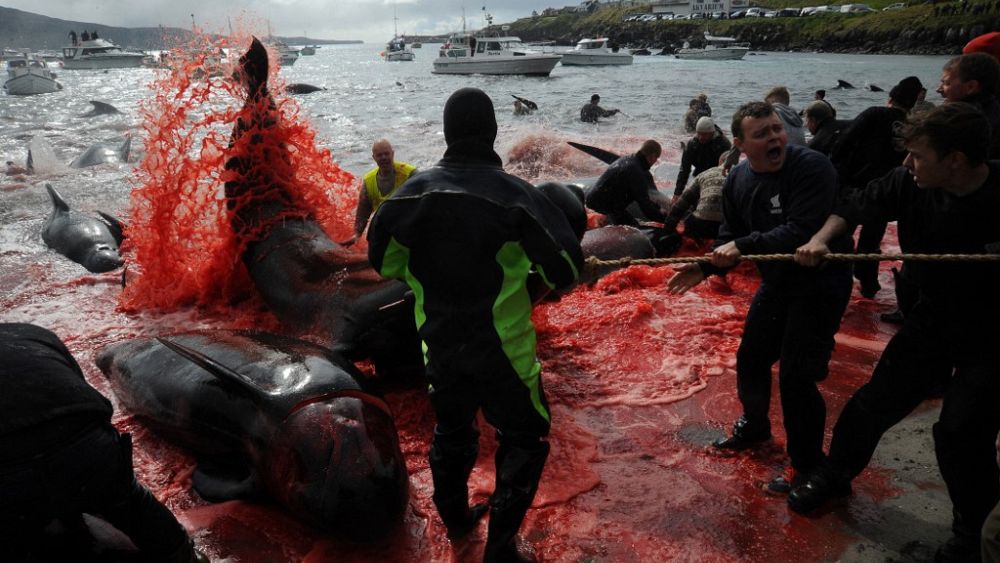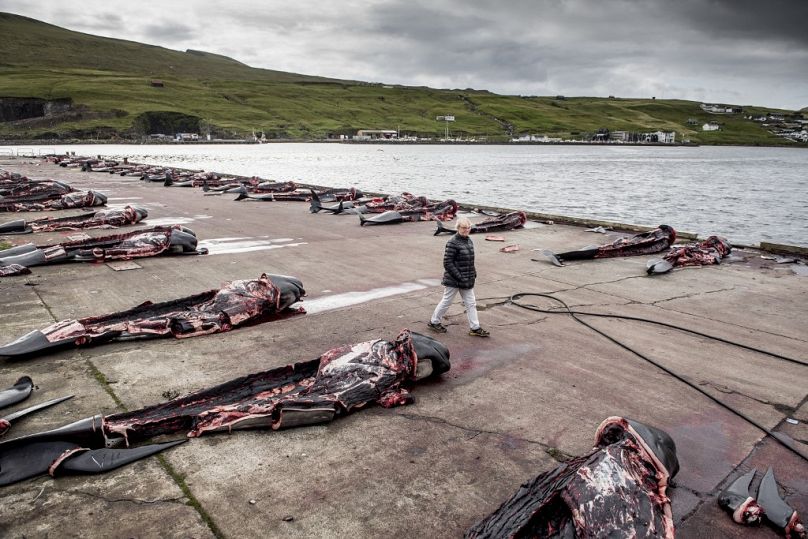
The Faroe Islands’ annual whale hunt has begun, sparking condemnation from animal rights groups – though it remains a complex cultural issue.
Two pilot whale hunts took place in the North Atlantic islands on 8 and 15 May, killing some 60 of the intelligent mammals.
More hunts are planned throughout the year, with John Houston of the global pressure group Blue Planet Society telling Euronews “hundreds” could be “butchered”.
He slammed the “cruel” practice, describing how pods – numbering 60 to 100 – are corralled into a fjord and then dragged on shore with hooks and “slaughtered” one by one.
With harpoons and firearms now forbidden at sea, blades and spikes are used to create catastrophic injuries that kill the animals.
Islanders largely support the “grindadráp” (as it is called in Faroese), calling it a cultural tradition. They say they have hunted the whales for centuries, with their meat and blubber an integral part of the local diet.

The Faroe Islands are an independent territory of Denmark, some 300km north of the United Kingdom.
Though pilot whales are protected under EU and UK law, the island’s autonomous status means it can set its own laws and rules.
“There’s absolutely no need for this level of cruelly in a country that has an average wage of about $60,000 a year and has a dozen supermarkets with globalised supply chains,” said Houston.
“Really it’s something they do every summer for a bit of enjoyment. It’s a blood sport”.
Evidence of whaling on the Faroe Islands dates back to 800 AD, with hunts featuring predominantly in Faroese art and literature.
Some see foreign campaigns against it as a form of cultural imperialism imposed on their small population of 50,000.
‘Killing beaches’
Hunts can be very long and distressing for highly social mammals, who can stay with their family members for life.
“The whole hunting and killing process can take the best part of a day,” says Houston.
Relying on echolocation, he tells Euronews how the sound of the boats – including jet skis and speedboats – places the pod in a “state of terror”, then “mostly men” descend on them and “effectively cut their throats”.
“The other family members wait in a bloodbath for their turn to be dragged up the beach,” Houston added.
In a statement sent to Euronews, Faroe’s Ministry of Foreign Affairs, Industry and Trade called the killing method – cutting the whale’s neck to severe the spinal cord – humane and quick.
It said a special lance, designed by a Faroese vet, kills the animal in “1-2 seconds”, while “normally an entire pod of whales is killed in less than fifteen minutes”.
Nevertheless, dispatching the whales can be very graphic, with the whole sea turning crimson red.
“There is no doubt that the Faroese whale drives are a dramatic sight to people unfamiliar to these hunts and to slaughter of mammals,” said the Ministry. “These whale drives are, nevertheless, well organised and fully regulated.”
Blue Planet Society spokesman Houston pushed back on this, raising concerns regulation was not sufficient.
“They butcher them in the outside with untrained people. Defenders try and liken it to a regulated slaughterhouse for farm animals. But it’s nothing like it,” he said.
Last year, 1,400 dolphins were killed in a hunt, sparking an international outcry. Rules were put in place by the authorities to limit the size of the catch to 500.
However, Houston said this would be difficult to enforce, with drivers encountering pods that can vary hugely in size.
He called on the EU and UK to apply pressure on the Faroe Islands to end the controversial practice, which has attracted protests, petitions and condemnation from celebrities – such as actress Pamela Anderson – in the past.
‘Pilot whales could become threatened, very very quickly’
Around 700 pilot whales on average are killed by islanders each year, reports the international marine conservation organisation Ocean Care.
The species is not threatened, deemed to be of “least concern” to conservationists.
Wildlife populations have plummed by 69% since 1970, according to the Living Planet Report 2022 by the World Wildlife Fund.
“We’re in a climate biodiversity crisis and this small self-governing island thinks it is okay to kill these animals in the most hideously cruel way possible,” said Houston.
“If we allow such extravagance, where a rich country can do this to intelligent beautiful creatures, we’re clearly not going to win the battle against climate change and the biodiversity crisis.”
“It’s just so obvious. It’s so blatant.”
In its statement for Euronews, the Island’s Foreign Ministry said: “The pilot whale catches in the Faroe Islands are sustainable”, adding it “has long since been internationally recognised” as so.





